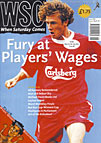 Cheltenham Town are to become the Football League’s newest members. Mark Herron explains how they did it
Cheltenham Town are to become the Football League’s newest members. Mark Herron explains how they did it
In 1994, the new chairman of Cheltenham Town’s neighbours and Doc Martens League rivals Gloucester City announced matter of factly that the team would win promotion to the Conference within two years, to the Football League within five and would throw in an appearance in the FA Trophy final for good measure.
While not taking these predictions too seriously, Robins supporters wondered why their own club never claimed such ambitions. There lay the problem. Although the romantics among us thought that Cheltenham – one of the largest towns without a League side and with no immediate competition from professional teams – could sustain Nationwide League football, few believed the club had the drive to get there.
Five years later, however, it is Cheltenham that has won promotion to, firstly, the Conference and now the Football League, and there was even time to pick up the FA Trophy along the way. Gloucester, meanwhile, still await the arrival of their trophy cabinet from Messrs Diddley and Squat.
The turnaround at Whaddon Road has been as swift. A little over two years ago, the Robins were struggling to live up to expectations in the Doc Martens League when the directors appointed Steve Cotterill as manager. In his first season, the club ground out enough points to secure the runners-up spot. Even then, promotion to the Conference was only achieved when the Moat Street home of champions Gresley Rovers caused the Conference Ground Grading Committee to employ its “Rejected” rubber stamp for the first time since 1990.
It soon became apparent that today’s Conference was not the same one we had left behind upon relegation in 1992. Everything about it is more professional and, in line with developments further up the football ladder, considerably more costly. (In the current campaign, Barrow and Doncaster, beginning the sea-son with Andy Mutch, Mike Marsh, Neville Southall, John Sheridan, Steve Nicol and Tommy Wright, found themselves battling against relegation.) Cheltenham were touted as relegation candidates last season, but ended the campaign as runners-up to Halifax Town and won the FA Trophy in a first Wembley appearance.
Our one-season wonders followed up with the championship. The football offered by the Robins is not necessarily any better than that seen elsewhere in the top half of the Conference, but Cheltenham prevailed through good, old-fashioned hard work.
The club has not been bankrolled; progress, so far, has been mostly self-financing. Attendances above the break-even figure have given Cotterill the opportunity to strengthen the squad, while the proceeds from cup runs have brought the facilities to a level that just about exceeds the League’s minimum requirements. Even the chairman, whose photo rarely features in the local newspaper, is so modest that he won’t even mind his name being omitted from this article.
Sceptics may argue that promotion to the Nationwide League will herald the beginning of the club’s problems and, no doubt, Cheltenham will face some difficulties in the years ahead. But will any really be more constraining than the Conference’s current one up-three down promotion/relegation system, or having to compete against two or three full-time squads when you only have part-time players?
The experience of other promoted sides has shown that we can expect the bubble to burst within two to three years of joining the Nationwide League. Steve Cotterill’s departure will probably be measured in months, not years; the players, many of whom are in their late twenties or older, will mostly drift back to non-League; and, for the first time since 1991-92, supporters will see the Robins finish lower than third.
Cheltenham Town will, no doubt, become just another lower division club but should still have more to offer than recent newcomers Scarborough, Barnet and Macclesfield, for no other reason than that market factors, such as population and geography, will work in the club’s favour.
Despite being at the wrong end of the Second Division, Wycombe Wanderers, with their apparently seamless transition to professionalism, and relatively impressive ground, remain the benchmark for promoted sides. Cheltenham are making positive noises: the first team squad will move towards professionalism, two new stands are promised and, after two previous half-baked attempts, the club seems set to introduce a fully-functioning youth policy. Meanwhile, the response of the local population, for so long waiting for a team worth getting behind, has surpassed expectations.
Cheltenham Spa may not be your idea of a typical football hotbed but, as demonstrated by the 18,000 turn-out for the 1998 FA Trophy final, it’s not just high-brow events, such as the highly acclaimed literature festival, which unite the townsfolk these days.
From WSC 148 June 1999. What was happening this month